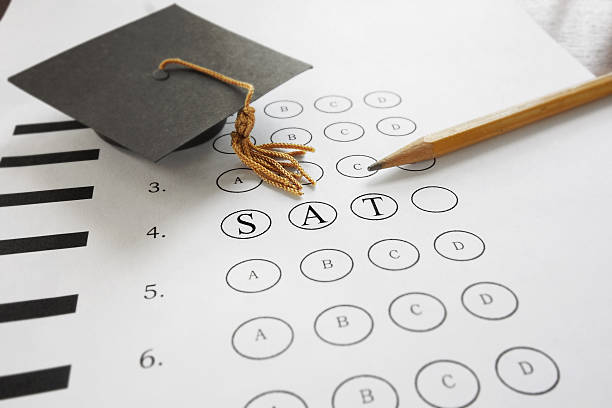As top universities bring back the SAT requirement, BASIS students are, characteristically, racing to complete it. Testing centers across the country have been packed to the limit as countless thousands of students vie to squander weeks and months studying, 3 hours taking the exam, and another month anxiously waiting for the results. But with that (hopefully) four-digit number out of 1600 mattering so much for college applications (cue heavenly orchestral music), here are some tips to help you maximize that number as much as possible.
But first, a little bit about myself. My name is Max, and I am currently a high school junior. I took the SAT paper test last November, right before the paper test was scrapped in favor of an online version. I will not reveal my score, but I’d say I did quite well. Certainly above average. So, although I may not be fully familiar with the new version, I am certainly qualified to give some tips and tricks for all of you prospective college students (which I assume all of you are).
-
- Sign up Early! Most students recognize the need to sign up early for the SAT. You might assume the time frame to be a few days or weeks in advance, a month at most. Unfortunately, for all ye naive minds out there, there are simply too many prospective college students just as enthusiastic as you are to torture themselves, especially in the Bay Area. One friend of mine (who shall remain nameless) cheerfully logged on to the College Board website on a sunny morning, a few weeks before the August SAT, only to find that the nearest testing center was in RENO (in Nevada)! Another, who decided to bide his time for even longer, was forced onto a stuffy plane and rendered to arid Phoenix, Arizona. So take my advice: unless you like wasting hundreds of dollars on a trip far, far away, sign up a few months in advance.
- Practice in set intervals…DON’T CRAM!: I know that as BASIS students, it is a customary ritual for us to forget about an upcoming test, only to be reminded of it during the day of, and speed through 50 pages of notes during lunch. This activity is commonly referred to as cramming! Take my advice: Do NOT cram for the SAT. Unlike many BASIS exams, the SAT is not based upon memorization, but rather on your ability to read, understand grammar, and do basic algebra and geometry quickly and accurately. So practice consistently. Do a practice test (you can probably find them online, or just purchase one of the many SAT prep books online) as a baseline, give yourself AT LEAST a week’s rest (so you don’t burn out early and give yourself time to refresh), and come back to do another practice exam. After a few months of this (I would recommend maybe 2-3), you will have done all the practice you can. Do NOT do a practice test the day before the exam. It will only stress you out.
- When Reviewing, Summarize Your Mistakes: unless you are literally the greatest test-taker of all time, at which point you wouldn’t need to read this article, you will make mistakes as you practice. That’s totally normal. And I know that this sounds corny, but it’s also the best way to learn. For each question that you get wrong, write down why you got it wrong. If there’s a lot of “I made a silly mistake,” (my personal favorite) then simply be more careful. But more often than not, you will begin to notice a pattern. You might notice things like: “I struggle with the science passage in the reading section,” “I have a hard time finding good replacement words in the writing section” or “I can’t add properly.” If that is the case, the next time you practice, you might want to specifically single out those types of questions and hammer them home. By targeting specific weaknesses, you can improve much faster compared to just doing another practice exam.
- Read the News: This piece of advice is specific to the reading and writing section. I know there are many of you out there (and this is BASIS, so I know this is true) who are dying to do a practice test every day, but just don’t have the time. So, when you do have those rare scraps of free time, pull up a news article, whether it be from the Associated Press, National Geographic, or the Quill (OK, don’t practice with that last one, unless you want to be wholly unprepared on test day) and just start reading. Most of the essays the SAT will excerpt from will be from news articles or journals targeted toward the general public. So getting good at comprehending those kinds of works will really boost that English score!
-
- Give Yourself Less Time Than the Actual Exam: it might seem counterintuitive, but as you’re doing practice tests, give yourself 5-15 minutes less time than you would actually have on the SAT. This not only trains you to be faster and more accurate, but also for unexpected turbulence as you take the exam. You will find that once you enter that testing room, the pressure of the whole situation will make you slow down and meticulously piece through each problem before moving on. This will take extra time, so if you’re already fast enough, it gives you that buffer time you might need. And if you end up finishing early, that’s just more time to check your work!
- Get Sleep!: I know you hear this one all the time. Get sleep before school! Get sleep before big events! And then nobody actually does it. But trust me, getting a good night’s sleep could give you a crucial boost to your SAT score. And I know everyone wants that!
- Don’t Take the SAT Over and Over: If you’ve talked to a counselor at our school, you’d know that they ask students not to take the SAT more than 3 times. That’s because once you’re past that limit, not only does your score usually flatten out, but colleges will see that you’ve taken it a bunch of times. The SAT does allow you to “cancel” your score, but colleges will still see that “canceled” label. And if they see 20 cancellations, well, let’s just say that colleges aren’t stupid.
These are just some basic tips for the SAT. Hope it helps!














![Teacher [Milk] Tea: Part 2](https://bisvquill.com/wp-content/uploads/2024/03/Screen-Shot-2024-03-19-at-9.28.48-PM.png)
![Teacher [Milk] Tea: Part 1](https://bisvquill.com/wp-content/uploads/2024/03/milk-tea.png)


































